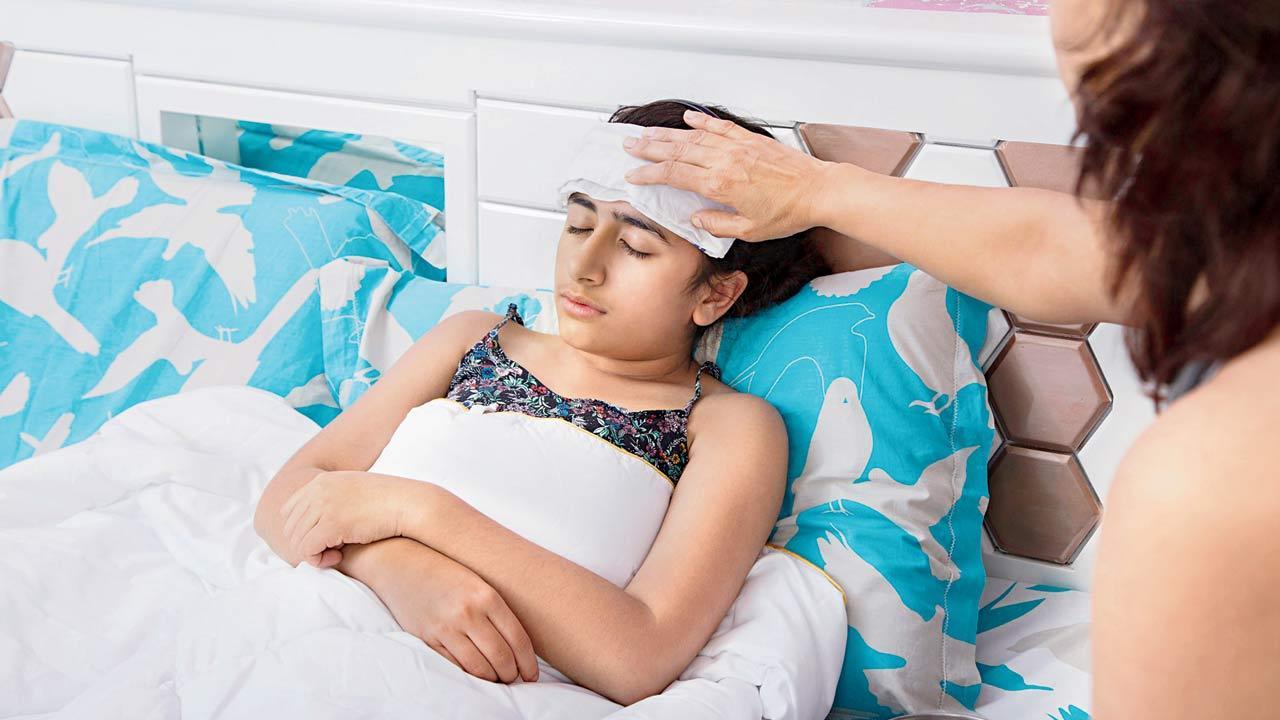This monsoon, doctors are seeing different pattern of gastroenteritis where fever and other symptoms persist for over a week

Children are prone to gastroenteritis during the monsoon. Representation Pic
Health experts are concerned as gastroenteritis, the most common ailment during monsoon, is turning out to be atypical and prolonged. Paediatricians are now coming across prolonged gastroenteritis cases with acute intestinal infection, marked with fever, vomiting and loose motions that continue over a week.
In the last couple of weeks, many children have shown symptoms of acute intestinal infection. Though all did not require hospitalisation, but for two and half-year-old Rafiq (name changed). The child required hospitalisation since Monday and was receiving medical treatment for over a week. Rafiq had loose motions 25-30 times in a day, leaving him dehydrated and his condition was worsening with every passing day.
Dr Minjal Jhaveri, paediatric resident doctor at Jaslok Hospital said, “This time we are witnessing a different pattern of gastroenteritis in children, where the fever, which would otherwise settle within two to three days of the viral infection, are now getting prolonged for over a week and so is other associated symptoms like vomiting, loose motions, and dehydration. And one of the common reasons for such an outbreak is contaminated food and water, which is the main cause of gastroenteritis.”

Dr Minjal Jhaveri, paediatric resident doctor at Jaslok Hospital
On being asked about the number of cases and age group of children visiting the OPD, Dr Jhaveri said, “On an average out of 10 to 15 cases visiting the OPD nearly 60 percent are that of gastroenteritis and remaining 40 percent are regular cold and fever. At present we have one child admitted in Jaslok Hospital who is under observation. The youngest patient is a two and half-year-old being treated at Saifee Hospital, with acute Gastroenteritis. Both kids are doing well.”
Treating doctor speaks
Dr Fazal Nabi, director of paediatrics at Jaslok Hospital, and also consultant with many South and Central Mumbai hospitals, who is also treating the youngest gastro patient (Rafiq) said, “This child was referred for an admission under my care for fever with vomiting and diarrhoea for a week. On July 8, the child was found to be disoriented, lethargic, listless and severely dehydrated with low blood pressure.”

Dr Fazal Nabi, director of paediatrics at Jaslok Hospital
“The provisional diagnosis of acute gastroenteritis was made out and the child was immediately put on symptomatic and supportive care like paracetamol, antibiotics and fluid electrolytes and he has shown good improvement,” said Dr Nabi.
Atypical cases on rise
Dr Nabi said, “Gastroenteritis is an acute intestinal infection marked by fever, vomiting and loose motions associated with abdominal cramps. It is an acute, short-lasting, self-limiting illness, with recovery in 3 to 5 days, but in this case, the child had symptoms for more than 7 days. This kind of atypical, prolonged gastroenteritis cases have become more common in this season.”
“In this case, the child (Rafiq) required early diagnosis and hospitalisation to prevent complications related to severe dehydration. Paediatricians and family physicians need to be alert to pick up atypical presentations of gastroenteritis and educate the parents about interpreting the red flag signs and preventive measures,” said Dr Nabi.
*RED FLAG SIGNS*
1. Large voluminous diarrhoea
2. Extremely lethargic
3. Listlessness
4. Disorientation
5. Decreased urine output
6. Peripheries are cold to touch as compared to warm bodies.
The above signs need immediate medical attention.
*PREVENTIVE MEASURES*
1.Try to maintain a high level of personal hygiene and hand washing in kids at all times
2.It is best to consume boiled and cooled water during monsoons
3.Eating freshly prepared food is the safest bet during monsoon
4.To avoid eating outside roadside food/ junk food due to high risk of contamination due to poor hygiene
5.Always wash fruits and vegetables before using them and avoid pre cut fruits or vegetables.
6.Rotavirus immunisation to prevent viral diarrhoeas.
7.As per UNICEF and WHO recommendations exclusively breastfeeding babies till 6 months and no bottle feeding.
Contaminated water is suspect
Mid-day had in its article titled ‘Pockets in Western suburbs getting filthy water in taps’ dated July 10, had highlighted the plight of Bhoomi Park complex in Malad West and Meghibai Chawl, Sahar Village, getting contaminated water.
Mohammed Hussain, 36, father of Rafiq, suspects that the water to their society supplied by TMC might have been contaminated. Hussain said, “Rafiq initially developed a cough and cold on July 1, and we suspected it due to the onset of monsoon and change in temperature. However, we found that he was gradually becoming weak and looked pale. He frequently passed loose motions, so we decided to rush him to a private practitioner in Mumbra.” As the child’s condition worsened despite the treatment by the general practitioner, Hussain was recommended by his relatives to bring their child to Saifee Hospital under the care of Dr Nabi.
Signs of improvement
Rafiq has shown much improvement since his admission on Monday. “I am thankful to the treating doctors and my relatives who gave me the right advice.”
Installed water purifier at home
Hussain admitted that he ignored the suggestion by family members to install a water purifier at home. However, they had made it a practice to boil water for drinking, but still his child had got infected. Hussain has now installed a water purifier at home and decided to continue the practice of having boiled water for drinking purposes.
Expert view
Triple whammy
“Recent heavy rains in Mumbai that brought downpour of 269 mm in eight hours created a triple whammy. The flooding of several feet high in most areas led to mixing of sewer and drinking water lines. This flooding also led to mixing of sewer water with underground drinking water in storage tanks of residential and commercial buildings,” said Dr Subhash Hira, professor of global health at University of Washington, USA.

Dr Subhash Hira, professor of global health at University of Washington, USA
“Secondly, water logging of fresh rain water as well as sewer water provides vast breeding ground for mosquitoes and starts transmission cycles of deadly diseases such as malaria, dengue, chikungunya etc. This will lead to a febrile illness epidemic for the next few months unless quick measures are undertaken for mosquito control,” said Dr Hira.
“The third whammy is the explosion of diarrhoea and respiratory diseases in the city due to rapid transmission of viral illnesses such as seasonal flu, influenza A to D, Hepatitis A to E, leptospirosis, etc. Quick diagnostic services for these illnesses need to be placed by BMC Health Services in the ward communities, ” he said.
Floods: Do’s & Don’ts
What to do before a flood
To prepare for a flood, you should:
- Avoid building in flood prone areas unless you elevate and reinforce your home.
- Elevate the furnace, water heater, and electric panel if susceptible to flooding.
- Install "Check Valves" in sewer traps to prevent flood water from backing up into the drains of your home.
- Contact community officials to find out if they are planning to construct barriers (levees, beams and floodwalls) to stop flood water from entering the homes in your area.
- Seal the walls in your basement with waterproofing compounds to avoid seepage.
If a flood is likely to hit your area, you should:
- Listen to the radio or television for information.
- Be aware that flash flooding can occur. If there is any possibility of a flash flood, move immediately to higher ground. Do not wait for instructions to move.
- Be aware of streams, drainage channels, canyons, and other areas known to flood suddenly. Flash floods can occur in these areas with or without such typical warnings as rain clouds or heavy rain.
If you must prepare to evacuate, you should:
- Secure your home. If you have time, bring in outdoor furniture. Move essential items to an upper floor.
- Turn off utilities at the main switches or valves if instructed to do so. Disconnect electrical appliances. Do not touch electrical equipment if you are wet or standing in water.
If you have to leave your home, remember these evacuation tips:
- Do not walk through moving water. Six inches of moving water can make you fall. If you have to walk in water, walk where the water is not moving. Use a stick to check the firmness of the ground in front of you.
- Do not drive into flooded areas. If floodwaters rise around your car, abandon the car and move to higher ground if you can do so safely. You and the vehicle can be quickly swept away.
Source- NDRF
 Subscribe today by clicking the link and stay updated with the latest news!" Click here!
Subscribe today by clicking the link and stay updated with the latest news!" Click here!








